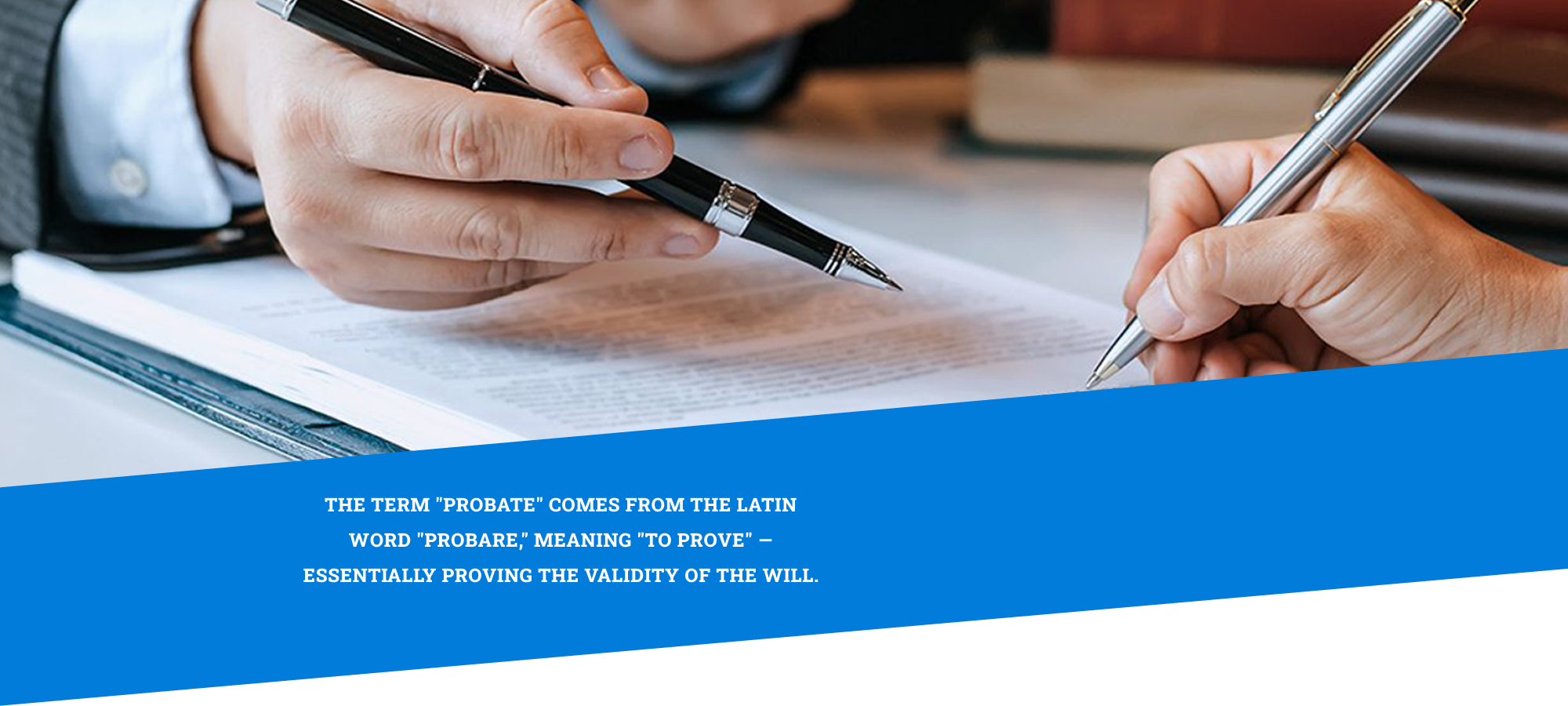PROBATE
A Guide to the Probate Process
The term "probate" comes from the Latin word "probare," meaning "to prove" — essentially proving the validity of the will.
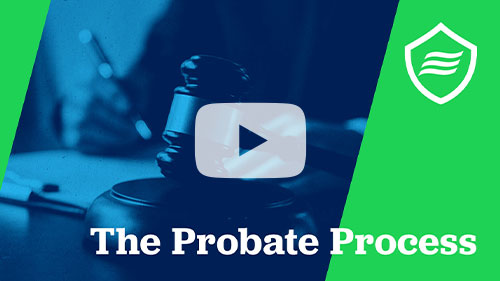
Probate is the legal procedure through which a deceased person's estate is properly distributed to heirs and designated beneficiaries, and their debts are paid after death. This court-supervised process ensures that assets are transferred according to the deceased's wishes (if there is a will) or according to state law (if there is no will).
Understanding the Probate Process
The probate process affects millions of Americans each year, yet many people don't fully understand how it works until they're faced with it during an already difficult time. Whether you're planning your estate or dealing with the estate of a loved one, understanding the probate process is essential for making informed decisions and avoiding unnecessary complications.
For many families, navigating probate can be overwhelming — it often involves complex legal procedures, potential delays, and unexpected costs. However, with proper knowledge and guidance, you can move through the probate process more efficiently and confidently.
When is Probate Necessary?
Before diving into the probate procedure, it's important to understand when probate is actually required. Not all assets need to go through probate, and in some cases, the process can be simplified or avoided entirely.
Probate is generally necessary when someone dies:
- Owning assets solely in their name without designated beneficiaries
- Without a living trust that holds their assets
- With certain types of property that cannot transfer automatically
Assets that typically require probate include:
- Real estate titled solely in the deceased's name
- Personal property, such as vehicles, furniture, and collectibles
- Bank accounts held only in the deceased's name
- Investments and securities without transfer-on-death designations
Assets that usually bypass the probate process include:
- Property held in joint tenancy with right of survivorship
- Assets with designated beneficiaries (life insurance policies, retirement accounts)
- Assets held in a properly established living trust
- Payable-on-death accounts or transfer-on-death registrations

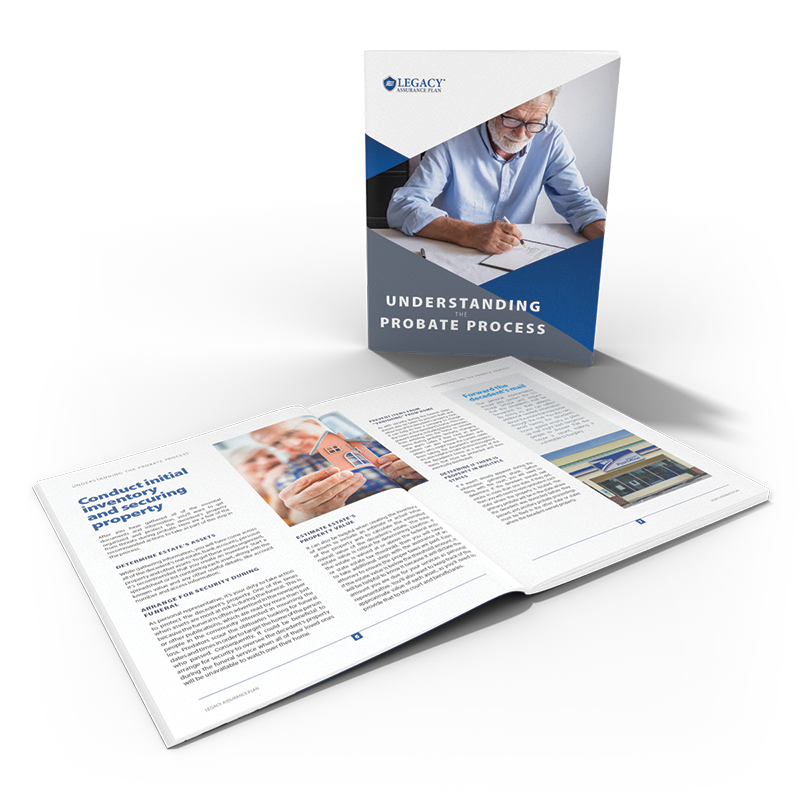
6 Steps in the Probate Process
The probate procedure typically follows a standard sequence of events, though specific requirements vary by state. Understanding these steps can help you navigate the process more effectively.
Step 1: Filing the Petition
What happens in this step:
The probate process begins when someone (usually the executor named in the will or a close family member) files a petition with the probate court in the county where the deceased person lived. This petition asks the court to officially begin probate proceedings and appoint an executor or administrator to manage the estate
Timeframe:
This initial step can take several months from filing to the first hearing.
Potential challenges:
Common issues include locating the original will, determining the appropriate court jurisdiction, and conflicts about who should serve as the estate representative.
Tips for efficiency:
- Locate the original will as soon as possible
- Gather death certificates and other required documentation before filing
- Consider consulting with a probate attorney for complex estates
Step 2: Notifying Heirs and Creditors
What happens in this step:
Once an executor or administrator is appointed, they must notify all interested parties about the probate proceedings, including heirs, beneficiaries named in the will, and creditors. Known creditors are directly notified by mail, while unknown creditors are notified through published legal notices in local newspapers.
Timeframe:
The notice to creditors typically provides a 3-6 month window for filing claims.
Potential challenges:
Locating all potential heirs can be difficult, especially with estranged family members.
Tips for efficiency:
- Create a comprehensive list of known creditors and heirs early
- Follow state-specific notice requirements exactly
- Don't distribute any assets until the creditor claim period has expired
Step 3: Inventory and Appraisal
What happens in this step:
The executor or administrator must identify, locate, and take control of all probate assets belonging to the deceased. This involves creating a detailed inventory and obtaining professional appraisals for certain assets to determine their fair market value at the date of death.
Timeframe:
Completing the inventory and appraisal process typically takes 2-3 months
Potential challenges:
Overlooked assets, disputes over valuation, and difficulty accessing financial information can complicate this step
Tips for efficiency:
- Begin gathering financial statements and property deeds early
- Use professional appraisers for high-value items
- Consider digital assets and intellectual property
Step 4: Paying Debts and Taxes
What happens in this step:
Before distributing assets to beneficiaries, the executor must ensure all legitimate debts and taxes are paid from the estate. This typically includes funeral expenses, medical bills, credit card debt, mortgages, loans, income taxes, and estate taxes (if applicable).
Timeframe:
This phase typically takes 3-6 months, depending on the complexity of the estate's finances.
Potential challenges:
Disputed creditor claims, insufficient assets to cover all debts, and complex tax issues can extend this timeframe.
Tips for efficiency:
- Establish a dedicated estate bank account
- Work with a tax professional experienced in estate matters
- Consider using a trust to manage assets and debts
Step 5: Distributing Assets
What happens in this step:
After all debts, taxes, and expenses have been paid, the executor distributes the remaining assets to the beneficiaries according to the terms of the will or state intestacy laws if there is no will.
Timeframe:
Asset distribution typically takes 1-2 months once debts and taxes are settled.
Potential challenges:
Family disputes over specific items, difficulties locating beneficiaries, and assets that have declined in value can complicate this phase.
Tips for efficiency:
- Communicate clearly with beneficiaries about the distribution timeline
- Address specific bequests first
- Document all distributions carefully
Step 6: Closing the Estate
What happens in this step:
The final step involves providing a detailed accounting to the court of all actions taken by the executor. Once this accounting is approved, the court issues an order closing the estate and discharging the executor from further responsibilities.
Timeframe:
Closing the estate typically takes 1-2 months after assets are distributed.
Potential challenges:
Beneficiaries may object to the accounting or claim the executor mismanaged assets
Tips for efficiency:
- Maintain organized records throughout the probate process
- Prepare a clear, comprehensive final accounting
Probate Costs: What to Expect
Probate expenses typically consume 3-10% of the estate's total value*. For a $500,000 estate, that could mean a $50,000 loss. Costs can vary widely depending on your state of residence and the estate's complexity.
The probate expenses typically include:
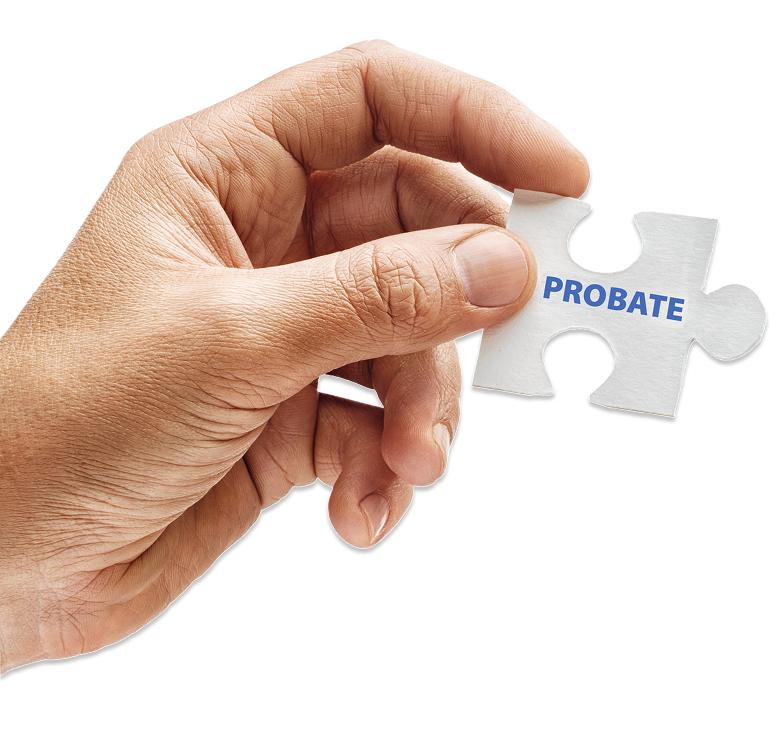
- Court filing fees
- Attorney fees
- Executor fees
- Appraisal and accounting fees
- Bond costs
- Publication costs
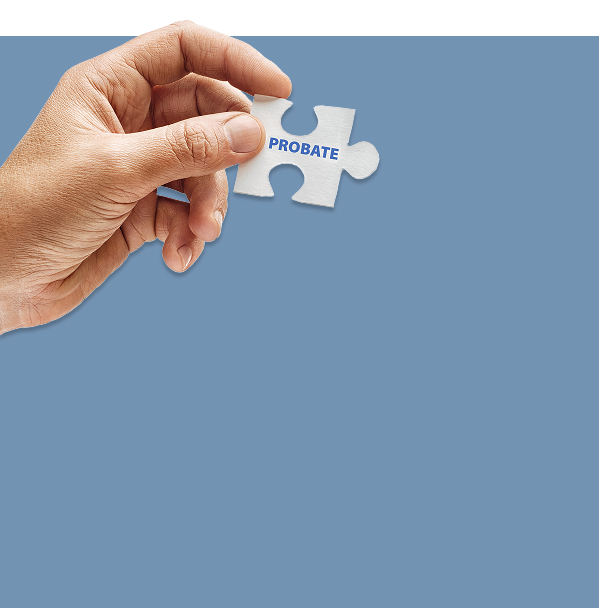
- Court filing fees
- Attorney fees
- Executor fees
- Appraisal and accounting fees
- Bond costs
- Publication costs
Alternatives to Probate
Many people seek to avoid or minimize probate due to concerns about cost, time, or privacy. Several effective alternatives can help assets transfer outside the probate process. A revocable living trust is a popular legal arrangement where you transfer assets into a trust during your lifetime. You maintain complete control as the trustee, but upon your death, your successor trustee distributes the assets according to your instructions—all without court involvement.
Joint ownership represents another strategy, where assets held jointly with rights of survivorship automatically pass to the surviving owner(s) when one owner dies. This arrangement is commonly used for real estate, bank accounts, and investments, especially between spouses. However, joint ownership is not without risks. Assets may become subject to the debts or liabilities of your co-owner, and there may be tax implications or gift tax consequences upon adding someone as a joint owner. Additionally, this method does not provide protection or management in case of your incapacity, and it can sometimes complicate your broader estate planning goals.
Beneficiary designations provide a third approach, as many financial accounts and insurance policies allow you to name beneficiaries who receive assets directly upon your death. These include life insurance policies, retirement accounts (401(k)s, IRAs), transfer-on-death investment accounts, and payable-on-death bank accounts. While beneficiary designations can help your assets avoid probate, they also carry potential drawback. They offer no management in the event of your incapacity, may inadvertently disinherit an intended beneficiary (since these designations override wills or trusts), and can result in distributions to minors or other unintended recipients. Careful review and coordination with your overall estate plan is essential to avoid these issues.
Each of these probate alternatives plays an important role in comprehensive estate planning, helping to ensure your assets transfer efficiently while potentially reducing costs and maintaining privacy. When combined thoughtfully with other estate planning tools like wills and powers of attorney, these probate-avoidance strategies help create a more effective overall plan that protects your legacy and provides for your loved ones according to your wishes.



